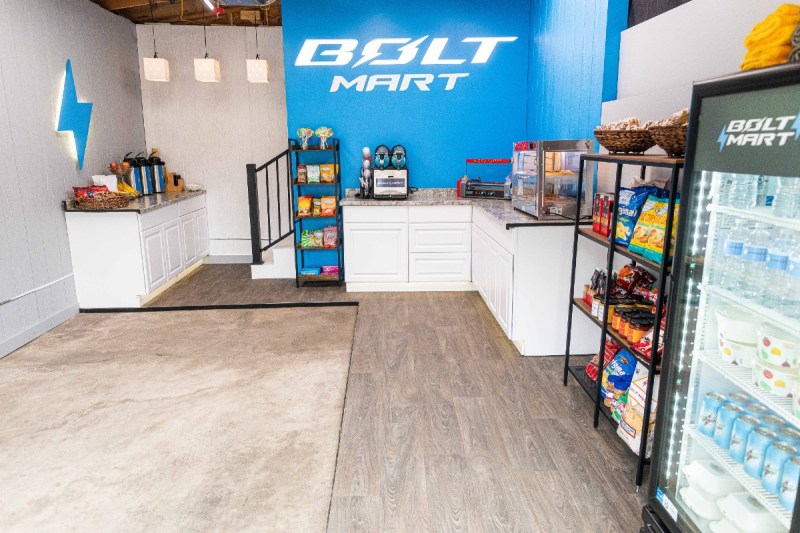According to a U.S. Department of Energy EV driver study, 80% of all electric vehicle charging is done at home. For years, GM has received Bolt EV owner requests to help stock guilty-pleasure snacks found at the gas station.
To offer a possible solution, Chevrolet transformed one Bolt EV owner’s former carport into the “ultimate EV garage” – stocking shelves and refrigerators with tasty treats to enjoy while charging their electric car at home. Demonstrating how EV drivers can have the best of gas stations without the gas, Chevrolet unveiled a complete garage makeover for Pamela Talley, a Bolt EV owner. Talley no longer has to miss her favorite gas station impulse buys with her new “ultimate EV garage.”

To complete the GM man cave — er, human-cave — Chevrolet collaborated with celebrity designer and builder Wendell Holland. Holland’s furniture can be found in high-end stores and his face can be found on reality TV, most notably as 2018’s Survivor: Ghost Island winner.
“I’ve seen firsthand how homeowners are evolving their space to fit the EV lifestyle, so collaborating with Chevy on this garage transformation was a seamless fit,” Holland said in a press release.

Tasked with redesigning the Denver resident and Bolt owner’s home, Holland worked with Talley like a celebrity stylist informing a new runway look made from old standbys.
“To create the ultimate garage space for Pamela, we incorporated inspiration from beloved gas station snacks and transformed the space into a modern oasis for EV living,” Holland said.
Chevy also polled the brand’s social channels to determine fans’ favorite gas station snacks and incorporated these into the makeover. Talley’s garage is now stocked with gas station highlights like a frozen soda machine, hot dog warmer, beef jerky buffet, bags of various chips, candies, a drink fridge, and more right outside her side door.

As EV’s gain steam with consumers, GM is getting creative to encourage gas guzzlers to make the switch to plug-ins. Not only is the Detroit car company helping to reimagine their own garages, but Chevrolet is also making it easier for Bolt EV/EUV owners to charge at home. The automaker promises to cover the standard installation of a “Level 2” charging outlet for eligible customers who purchase or lease a 2022 or 2023 model year Bolt EV/EUV1, for example. Partnering with Qmerit, Chevrolet’s official EV charging solutions installation partner, the offer for the free setup is there as an extra incentive for potential customers. Chevy aims for this access to faster charging to be just another reason to make the leap to voltage.
“One of the best features of living with an EV is charging — or ‘refueling’ — at home,” Steve Majoros, vice president of Chevrolet Marketing, said. “We want to provide Chevy customers with the seamless ability to enjoy charging at home as we bring more electric vehicles to market.”
While charging at home is convenient for some EV owners, GM is also investing nearly $750 million in the EV ecosystem to expand access to charging at home, work, and in the public realm. With the second version of the myChevrolet mobile app, Chevy hopes to enable access to more than 100,000 public chargers through 11 major charging networks.



